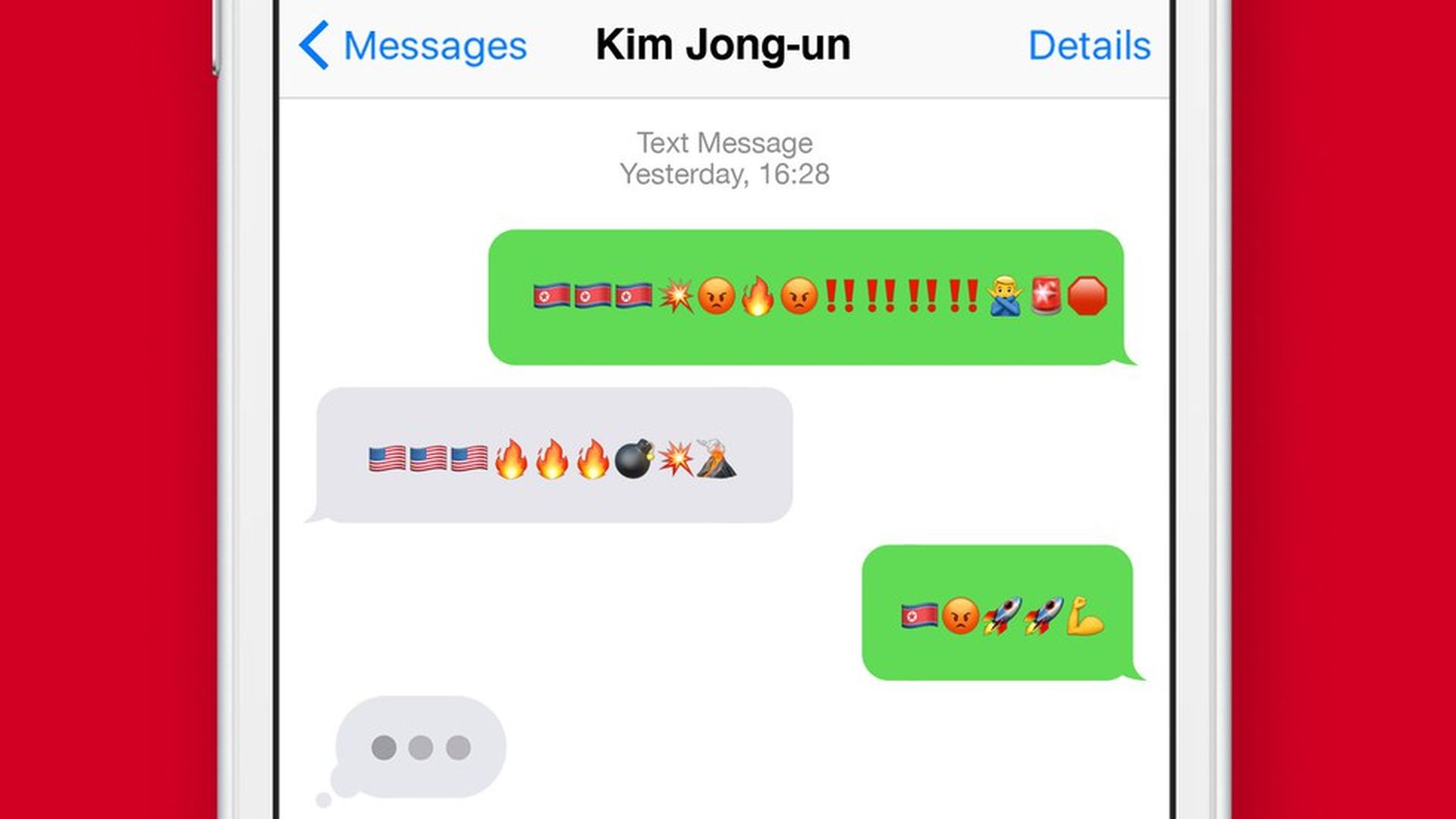Sep 22, 2017 - Politics & Policy
Trump's war of words with North Korea
Add Axios as your preferred source to
see more of our stories on Google.

Illustration: Rebecca Zisser / Axios
President Trump is known for his fiery, distinctive voice on Twitter, but he might have met his match. North Korea's state-run media arm, the Korean Central News Agency, often issues flamboyant threats to the United States.
Why it matters: The leaders of two nuclear-armed nations are engaged in a rhetorical game of chicken. While it has largely been limited to simple name-calling (think: Trump's nickname of "Rocket Man" for Kim), the childish aspects of their words risk spilling over into bona fide geopolitical and nuclear catastrophe.
Sanctions
- May 29: North Korea launches a short-range ballistic missile test, causing Trump to goad China via a tweet:
- June 2: The United States and China agreed to targeted sanctions against North Korea during a U.N. Security Council meeting.
- June 9: North Korea issues a response to the sanctions: "The army and people of the DPRK will shatter to the smithereens the U.S. and its followers' unprecedented 'sanctions' and pressure racket with the great spirit of self-development and invincible military might."
ICBM test
- July 4 (Pyongyang time): North Korea tests an intercontinental ballistic missile capable of striking the continental United States. The regime promptly and defiantly blames U.S. policy for necessitating the launch: "Unless a fundamental end is put to the U.S. hostile policy toward the DPRK and the nuclear threat to it, the DPRK will never put the nuke and ballistic rocket on the negotiating table nor take even an inch back from the road of bolstering the nuclear force which it has already taken. One has to adopt a new way of thinking, first, if one wants to deal with the DPRK."
- July 3 (Eastern time): Trump personally dismisses Kim while condemning the ICBM launch. He again calls on China to do something regarding North Korea:
"Fire and fury"
- August 8: During an impromptu Bedminster press conference, Trump threatens North Korea: "[T]hey will be met with fire and fury, and, frankly, power the likes of which this world has never seen before."
- August 9: North Korea releases a statement slamming the "reckless nuclear war frenzy" of the U.S.: "The U.S. imperialists' ridiculous bluffing never works on the DPRK. They had better not provoke the DPRK any more, mindful of its deplorable fate on the verge of ruin."
- August 11: Trump doubles down with his fiery rhetoric on Twitter:
Nuclear test
- September 3: North Korea conducts an underground nuclear test, which it claims was a hydrogen bomb. Trump issues a veiled economic threat to both North Korea and China on Twitter:
- September 10: North Korea says that "sanctions and pressure will never work," touting the success of its nuclear test: "[C]lear is the fact that the more recklessly the U.S. resorts to irrational sanctions, pressure and military threats to the DPRK, the more rapidly the defense capability of Juche Korea will develop beyond the world's imagination. The perfect success in the H-bomb test for ICBM that shook the earth is its eloquent proof."
U.N. General Assembly
- September 15: In the days prior to start of the U.N. General Assembly, North Korea tests a ballistic missile that overflies Japan.
- September 17:
- September 19: Trump threatens to "totally destroy" North Korea in his speech to the General Assembly. He calls the regime's actions "a suicide mission for [Kim Jong Un] and for his regime" and again refers to the North Korean leader as "Rocket Man."
- September 20: North Korea's response statement is titled "U.S. Will Meet Nuclear Strike and Final Ruin": "[North Korea] is now in full readiness to destroy the enemies' bases with its resolute and preemptive strike if they show any slight sign of provocation."
